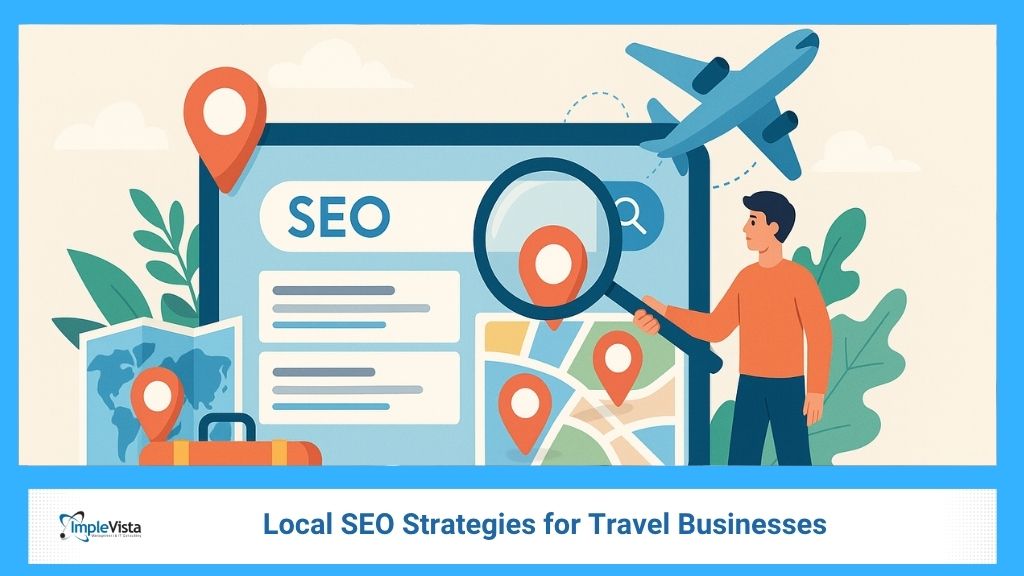In 2026, the travel industry faces increasing competition, making it essential for businesses to enhance their online presence. Local SEO (Search Engine Optimisation) plays a pivotal role in helping travel companies attract nearby customers and stand out in local search results. This comprehensive guide explores the most effective local SEO strategies tailored for travel businesses aiming to dominate the digital landscape in 2026.
Understanding Local SEO for Travel Businesses
Local SEO involves optimising your online presence to attract more business from relevant local searches. For travel businesses, this means appearing in search results when potential customers look for services in your area. Key components include:
- Google Business Profile Optimisation: Ensure your profile is complete with accurate business information, photos, and regular updates.
- NAP Consistency: Maintain consistent Name, Address, and Phone Number across all online platforms to build trust and improve local rankings.
- Local Citations: Get listed in reputable local directories to enhance credibility and visibility.
Top Travel Business Marketing Strategy for Travel Businesses:
As Implevista Digital, we’ve identified the following key strategies that will be crucial for travel businesses aiming for local SEO for travel industry success in 2026:
-
Optimising Your Google Business Profile (GBP)
Your Google Business Profile (formerly Google My Business) is the most critical element of your local SEO strategy. It’s often the first impression potential customers have of your business in local search results and Google Maps. To optimise your GBP for 2026:
- Claim and Verify Your Listing: Ensure your GBP listing is claimed and fully verified with accurate information.
- Complete Every Section Thoroughly: Fill out all the details, including your business name, address, phone number (NAP), website URL, business hours, categories, attributes (e.g., Wi-Fi, accessibility), and services offered.
- Use High-Quality Photos and Videos: Showcase your best offerings, including your premises, destinations, tours, and customer experiences. Use relevant alt text for all visuals, incorporating keywords like “hotel in Dhaka” or “Sundarbans tour operator.”
- Encourage and Respond to Reviews: Customer reviews significantly impact your local ranking and reputation. Actively solicit reviews from satisfied customers and respond to all reviews, both positive and negative, professionally and promptly.
- Regularly Post Updates and Offers: Utilise the “Posts” feature to share news, promotions, events, blog posts, and special offers. This keeps your profile active and engaging. For instance, you could post about a “20% off Dhaka city tour for residents.”
- Answer Questions Promptly: Monitor and answer questions asked by users in the Q&A section of your GBP listing. This demonstrates your responsiveness and provides valuable information to potential customers.
- Utilize GBP Insights: Regularly review Google’s insights to understand how customers are finding your listing and interacting with it. This data can inform your optimisation efforts.
- Consider Google Local Services Ads: These pay-per-lead ads appear at the top of local search results and can be a highly effective way to attract immediate attention from local customers actively searching for travel services.
2. Building and Maintaining Consistent NAP Citations
NAP (Name, Address, Phone number) citations are mentions of your business name, address, and phone number on other online platforms. Consistency in your NAP information across all online directories and platforms is crucial for local SEO. Inconsistent information can confuse search engines and negatively impact your rankings.
- Identify Key Local Directories: Focus on prominent local business directories relevant to Bangladesh, such as Yellow Pages Bangladesh, BDTouch, and others. Also, include general business directories like Yelp, TripAdvisor (especially for travel businesses), and Facebook.
- Ensure Accuracy and Consistency: Double-check that your NAP information is the same on all platforms as it appears on your Google Business Profile and website. Pay attention to abbreviations, formatting, and spelling.
- Consider Structured Data Markup (Schema.org): Implement local business schema markup on your website to provide search engines with clear and structured information about your business, including your NAP details.
-
Optimizing Your Website for Local Search
Your website is the central hub of your online presence. Optimising it for local search is essential to attract and convert local customers.
- Local Keyword Integration: Conduct thorough keyword research to identify the local keywords that your target audience is using. Incorporate these keywords naturally throughout your website content, including page titles, headings (H1, H2, H3), meta descriptions, body text, image alt text, and URLs. Examples include “Dhaka tour packages,” “hotels in Cox’s Bazar near the beach,” “local travel agency in Bangladesh,” and “best resorts in Sylhet.”
- Local SEO Content Strategy: Develop blog posts and articles that cater to local interests and needs. Topics could include “Top things to do in Dhaka,” “Best time to visit the Sundarbans,” or “Local food experiences in Chattogram.”
- Mobile-Friendliness: Ensure your website is fully responsive and provides a seamless experience for mobile users. A significant portion of local searches happens on mobile devices.
-
Leveraging Local Content Marketing
Creating and distributing valuable, locally focused content can significantly enhance your local SEO for travel industry efforts and attract a local audience.
- Blog Posts: Write informative blog posts about local attractions, events, travel tips, and insider guides relevant to your target locations. For a travel agency in Dhaka, blog topics could include “Exploring Old Dhaka’s Historical Sites” or “A Weekend Getaway to Srimangal’s Tea Gardens.” Localised blog content is a powerful tool in SEO for the travel industry.
- Local Guides and Resources: Develop comprehensive local guides or resources that provide valuable information for tourists and locals alike. This could include downloadable maps, itineraries, or lists of local recommendations. Providing valuable local resources enhances your SEO and your standing in the travel industry.
- Videos: Create engaging videos showcasing local destinations, your services, customer testimonials, or virtual tours. Optimise video titles and descriptions with relevant local keywords. Video marketing is an increasingly important aspect of SEO for the travel industry.
- Infographics: Design visually appealing infographics that present local travel data, tips, or interesting facts. Infographics can improve engagement and support your SEO strategy for the travel industry.
-
Mastering Online Reviews and Reputation Management
Online reviews are a critical trust signal for potential customers and significantly influence local search rankings. Effective reputation management is crucial for SEO in the travel industry.
- Actively Solicit Reviews: Make it easy for satisfied customers to leave reviews on your Google Business Profile, TripAdvisor, Facebook, and other relevant platforms. Consider using email follow-ups or in-person requests. Gathering reviews is a key tactic in SEO for travel industry.
- Respond to All Reviews: As mentioned earlier, respond to all reviews, both positive and negative, in a timely and professional manner. Thank reviewers for their positive feedback and address negative feedback constructively, demonstrating your commitment to customer satisfaction. Responding to reviews positively impacts your SEO for travel industry.
- Monitor Your Online Reputation: Regularly monitor review sites and social media for mentions of your business. Address any negative feedback or concerns promptly. Consistent monitoring is vital for SEO in the travel industry.
- Highlight Positive Reviews: Showcase positive reviews on your website and social media channels to build trust and credibility. Featuring positive feedback can enhance your SEO for travel industry efforts by building trust.
-
Building High-Quality Local Links
Just like with traditional SEO, backlinks from authoritative and relevant websites can significantly boost your local search rankings. Focus on acquiring local links to strengthen your SEO for travel industry.
- Local Business Directories: Ensure your business is listed in relevant local business directories (as mentioned in NAP citations). Directory listings provide valuable local links for seo for travel industry.
- Partnerships and Collaborations: Seek opportunities to partner with other local businesses, tourism boards, or community organisations and ask for a link back to your website. Strategic partnerships can yield valuable links for SEO in the travel industry.
- Sponsorships: Sponsor local events or initiatives and look for opportunities to get a link from their websites. Local sponsorships can be a source of quality backlinks for SEO in the travel industry.
- Guest Blogging: Contribute guest posts to relevant local websites or blogs. Guest blogging on local sites can provide relevant backlinks for seo for the travel industry.
-
Optimising for Voice Search
Voice search is becoming increasingly popular, and travel-related queries are no exception. Optimize your content for voice search by considering its impact on seo for travel industry.
- Focusing on Long-Tail Keywords: Voice searches are often longer and more conversational than typed searches. Target long-tail keywords that reflect natural language queries, such as “What are the best historical sites to visit in Dhaka?” Long-tail keywords are crucial for voice search optimization in seo for travel industry.
- Answering Questions Directly: Structure your content to directly answer potential questions that users might ask through voice search. The FAQ section (Strategy 10) is significant for this. Providing direct answers aids voice search SEO for travel industry.
- Using Natural Language: Write in a conversational tone that mirrors how people speak. Natural language content aligns well with voice search trends in SEO for travel industry.
-
Mobile Optimization and Core Web Vitals
In today’s mobile-first world, having a mobile-friendly website is non-negotiable. Google also prioritizes websites that offer a great user experience, as reflected in its Core Web Vitals metrics (Largest Contentful Paint, First Input Delay, and Cumulative Layout Shift). Mobile optimization is a cornerstone of modern SEO for travel industry.
- Responsive Design: Ensure your website adapts seamlessly to different screen sizes. Responsive design is essential for mobile seo for travel industry.
- Mobile-First Indexing: Understand that Google primarily crawls and indexes the mobile version of your website. Mobile-first indexing underscores the importance of mobile SEO for travel industry.
- Page Speed Optimization: Optimize your website for fast loading times on mobile devices. Page speed is a critical factor in mobile SEO for travel industry.
- Improve Interactivity and Visual Stability: Ensure your website is easy to interact with and doesn’t have unexpected layout shifts. Optimizing Core Web Vitals enhances your SEO for travel industry.
-
Utilizing Local Social Media Strategies
Social media platforms can be powerful tools for reaching and engaging with your local audience. A strong social media presence supports your overall SEO efforts in the travel industry.
- Create Location-Specific Content: Share content relevant to your local audience, such as local events, promotions for local residents, and highlights of nearby attractions. Location-specific content on social media complements your SEO for travel industry strategy.
- Engage with Local Followers: Respond to comments and messages from local users and participate in local conversations. Local engagement on social media strengthens your SEO for travel industry efforts.
- Run Location-Based Ads: Use social media platforms targeting options to reach users in specific geographic areas. Location-based social media ads can drive local traffic and support your SEO for travel industry goals.
- Partner with Local Influencers: Collaborate with local travel bloggers or social media personalities to promote your business to their followers. Influencer marketing can broaden your reach within the travel industry’s SEO.
-
Analyzing and Adapting Your Strategy
Local SEO for travel industry is an ongoing process. It’s crucial to track your performance, analyze your results, and adapt your strategy accordingly.
- Monitor Your Rankings: Track your rankings for key local keywords in Google Search and Google Maps. Regular ranking monitoring informs your SEO for travel industry adjustments.
- Analyze Website Traffic: Use Google Analytics to monitor traffic from local searches and identify which strategies are driving the best results. Website traffic analysis is key to refining your SEO for travel industry approach.
- Track Conversions: Monitor your booking inquiries, website contact form submissions, and phone calls to measure the effectiveness of your local SEO for travel industry efforts. Conversion tracking demonstrates the ROI of your SEO for travel industry strategy.
- Stay Updated on Algorithm Changes: Keep abreast of any updates to Google’s local search algorithms and adapt your strategy as needed. Staying informed about algorithm changes is vital for long-term SEO and the success of the travel industry.
FAQs: Local SEO for Travel Businesses
- What is local SEO, and why is it essential for travel businesses?
Local SEO focuses on optimising your online presence to attract more business from relevant local searches. For travel businesses, it helps them appear in search results when potential customers look for services in their area.
- How can I optimise my Google Business Profile?
Complete your profile with accurate business information, add high-quality photos, encourage reviews, and post regular updates to engage your audience.
- Why is mobile optimisation crucial for my travel website?
With most travel searches conducted on mobile devices, a mobile-friendly website ensures a seamless user experience, leading to higher engagement and conversions.
- What is structured data markup, and how does it help?
Structured data helps search engines understand your content better, enhancing its visibility and the possibility of rich snippets in search results.
- How can I create localised content for my audience?
Develop content that highlights local attractions, events, and services, and use localised keywords to address the specific needs of your target audience.
- What are local backlinks, and why are they important?
Local backlinks are links from local websites that point to your site. They enhance your site’s authority and improve local search rankings.
- How can I optimise my website for voice search?
Use natural language, focus on local intent queries, and structure your content to answer questions directly to improve voice search visibility.
- What tools can I use to monitor my SEO performance?
Google Analytics and Search Console are valuable tools for tracking website traffic, user behaviour, and SEO performance.
- How often should I update my Google Business Profile?
Regularly update your profile with new photos, services, and posts to keep your audience informed and engaged.
- How can I stay updated with SEO trends?
To stay informed about the latest SEO trends and best practices, follow reputable SEO blogs, attend webinars, and participate in industry forums.
Conclusion: Partner with Implevista Digital for Local SEO Success in 2026
Implementing effective local SEO strategies is vital for travel businesses aiming to thrive in 2026. By optimising your online presence, focusing on mobile users, creating localised content, and building strong local connections, you can enhance visibility and attract more customers. Stay proactive in adapting to SEO trends to maintain a competitive edge in the ever-evolving digital landscape.
At Implevista Digital, we are committed to providing tailored and effective digital marketing solutions to help your travel business thrive. Our SEO agency, with its team of experts in Dhaka, understands the local market dynamics and possesses the knowledge and experience to craft a winning local SEO strategy for your business. Contact us today for a consultation, and let us help you pave the way for a prosperous 2026 and beyond!









